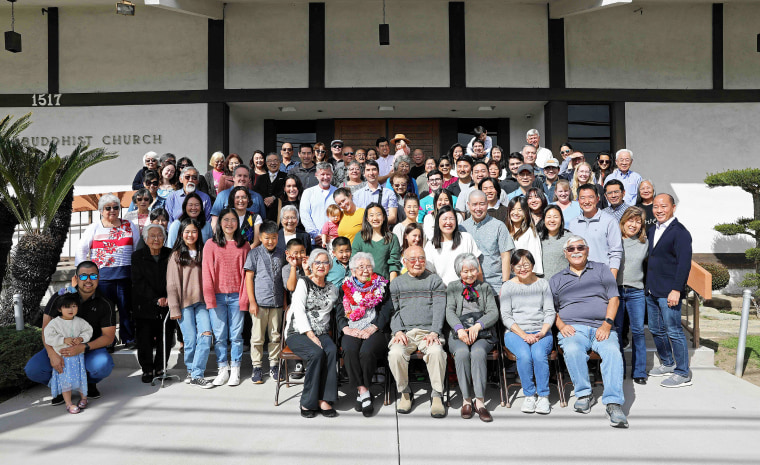With 110 years of life behind her, Yoshiko Miwa isn’t going to wallow in the negative, and she doesn’t want you to either.
The oldest living person of Japanese ancestry in the United States, according to the Gerontology Research Group, Miwa prefers to focus on the moments when she was happiest. She lived through the Spanish flu, prohibition, Black Tuesday, World War II and the losses of her parents, siblings and friends, and yet the supercentenarian’s longevity advice is: don’t push it.
Miwa is part of the Nisei — the second generation of Japanese Americans sent to internment camps during World War II — who often say “gaman,” which means “to endure the seemingly unbearable with patience and dignity,” said Alan Miwa, his son. . TODAY. with. It is often loosely translated as “perseverance,” “patience,” or “tolerance.”
These feelings, Alan Miwa suspects, are born of the resilience of many members of his mother’s generation – who had a lot to endure. Shikata ga nai (仕方がない), a Japanese phrase meaning “It can’t be helped” or “Nothing can be done about it,” is also a common saying among them, he adds.
Yoshiko Miwa was born Yoshiko Tanaka on February 28, 1914, in Guadeloupe, California, to Japanese immigrants. She was the fifth of seven children. When her mother and little brother died in 1919, her father struggled to care for his family and tend to the farm he owned. So, Yoshiko Miwa and her siblings were sent to live in the children’s home founded by their parish, the Buddhist Church of Guadalupe.
She graduated from Santa Maria High School in 1932 and studied business at the University of California, Berkeley, graduating in 1936. She married Henry Miwa in 1939.
During World War II, the pair and their families were sent to Poston Internment Camp in Arizona before moving to Hawthorne, California after the war. When they, along with many other Japanese people, had difficulty finding work after being liberated in 1945, her husband founded a plant nursery, and in 1963, Yoshiko Miwa obtained her nursing license.
Yoshiko Miwa has three children, 10 grandchildren, 20 great-grandchildren and a great-great-grandchild.
Currently, Alan Miwa says he is in good health and lives in a health institution, where he gets his hair done weekly and attends religious services on Sundays.
In addition to a positive spirit, keeping your mind and body active is the key to a long life, Yoshiko Miwa said in the past. Below, she shares some other aspects of her life that she believes have led to her longevity.
She maintains an ever-growing list of hobbies
When Yoshiko Miwa retired, she walked 4 miles every morning. In 1990, at age 76, she walked 20 km as part of the March of Dimes Walkathon. She is an avid reader, practices ikebana (flower arranging), sumi-e (Japanese ink art), sashiko (Japanese sewing), sewing, furniture refinishing, and upholstery.
These days, though, her favorite activity is sleeping, she told TODAY.com in an email.
She wrote an autobiography
After taking a writing course, Yoshiko Miwa wrote an autobiography. In it, she recalls her trips to Rome, Japan, Paris and Niagara Falls. She describes life in the orphanage and the long walks to school, her siblings, and her childhood with her parents.
“We had a large pasture for horses and cows to graze,” she wrote of her family farm in her autobiography. “Some days my sister and I would wander through the pasture to gather wild violets that grew there.”
She loves to eat pasta
Yoshiko Miwa is a fan of any type of noodle and eats it every day. “When I was in the orphanage, the cook made pasta and I loved it,” she says. “Today I like spaghetti, udon, ramen, soba and any other type of noodle.”
Your faith energizes you
Yoshiko Miwa is grateful to Rev. and Mrs. Issei Matsuura of the Buddhist Church of Guadalupe, who took her in when her mother died of Spanish flu.

Yoshiko Miwa was 4 years old when her father asked the church for help. “The church then opened a home for children and taught us Buddhism, the Japanese language, Japanese culture and responsibility,” she recalls. “I have always been indebted to Rev. and Mrs. Matsuura.”
…And her family too
The Miwa family travels together and organizes meetings. “I was lucky that my children, my grandchildren, my great-grandchildren and relatives were always by my side,” says Yoshiko Miwa.
“Because my mother died so young, I never enjoyed the warmth and love of a family unit,” she wrote in her autobiography. “Later, when I had my children, I deeply felt the wholesomeness of a complete family.”
This story originally appeared on NBCNews.com read the full story































/cdn.vox-cdn.com/uploads/chorus_asset/file/25514416/1528729343.jpg?w=300&resize=300,300&ssl=1)


/cdn.vox-cdn.com/uploads/chorus_asset/file/25508671/2158015570.jpg?w=300&resize=300,300&ssl=1)


